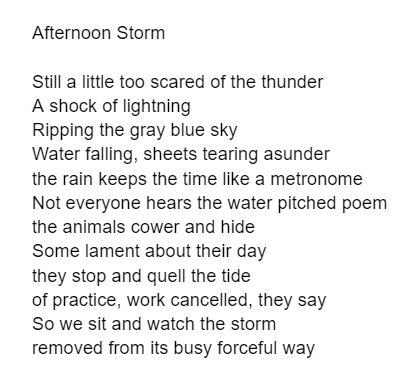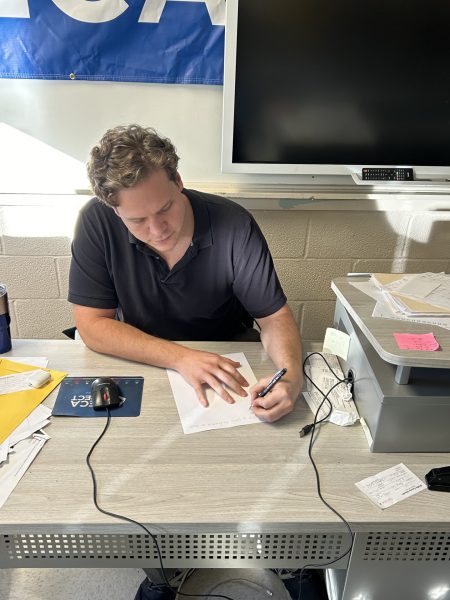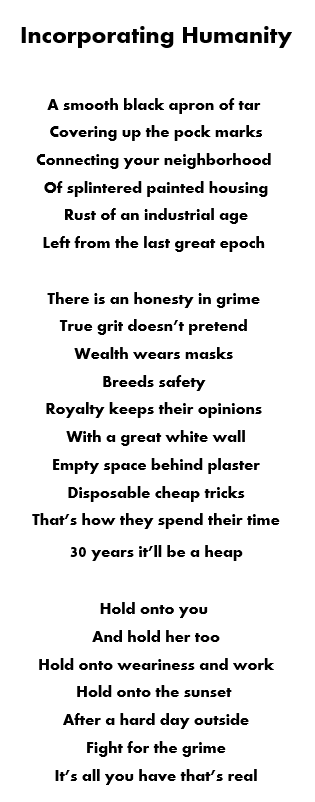‘What is the function of the enjambment in this line?’ ‘How does the author’s shift from pastoral to urban imagery contribute to the meaning of the work?’ ‘What effect does the iambic pentameter confer on the way the poem is spoken?’ Many students may be haunted by these questions. Poetry units in English classes can be one of the most difficult to navigate and interpret — it may come across as a detached aspect of the English language, accessible only to those who think abstractly and symbolically enough. However, for students at White Station High School (WSHS), poetry is written closer than they might expect.
Andrew Bell, a Business and Marketing teacher at WSHS, writes poetry in addition to teaching his students. He first started writing down what would eventually become his poetry at an early age, with it first taking form as small writings conveying his thoughts.
“Well, I’ve always just really jotted things down my whole life with just written little notes about this or that, things I was feeling,” Bell said. “So it didn’t really start out as poetry; it just started out as sort of this need to express myself through writing, and I would say that that probably started in college and maybe even high school.”
With unexpected free time due to the COVID-19 pandemic, Bell was able to immerse himself in poetry and practice his writing. Though his writing frequency varies, he currently writes about one poem a week.
“I go through [writing] periods that are more prolific than others,” Bell said. “Right now, it’s been pretty prolific. Before, it was sort of hot-and-cold. Sometimes I’d be writing stuff down — I’d kind of get into it and jot stuff down a couple times a week — and then maybe it would turn into something … I would say that [the pandemic] would be [the time] where I really solidified my voice, because, you know, it was always a hobby of mine, and so maybe this could be something that I could work on while I have all this extra time.”

Naturally, developing one’s poetic or literary voice can take years of practice and revision. However, once this voice is found, one’s writings can become that much more poignant and enjoyable to create. Bell’s awareness of his writing voice arose unexpectedly after several years of writing.
“I don’t think I was very good [at first],” Bell said. “[Poetry] was just something that made me feel good, and so I kept doing it, and I kept growing and having these experiences and living my life, and I kept jotting these notes down here and there. It was just one day, like all of a sudden I realized that ‘this is actually pretty decent now. I like the way this sounds and the themes; I like the imagery.’ It was all of a sudden I had this very strong voice — that gave another level of enjoyment to it.”
Given how much poetry varies from poet to poet and structure to structure, what makes poetry “good” equally varies from person to person. However, Bell believes that “good” poets developed their voices from the following life events:
“I think, one, [writers] have to have gone and sought out adventure and have tried to put themselves in uncomfortable situations on purpose, just to see what it’s like,” Bell said. “[They] have to have purposely gone outside friend groups and tried to experience what life is like for others. I [also] think you have to be well-read.”
With how syntactically small some poems are, many students may expect them to be first drafts, just abstract thoughts put down into writing. Though this immediate success on an early draft does occur from time to time, countless poems nevertheless involve several rounds of revision before they achieve their writer’s purpose.
“I’ve had poems come all out at once and be pretty perfect,” Bell said. “You know, I’ll go back and change a word here or a comma or maybe rewrite a stanza, but sometimes they come out more or less with very little editing. But then other times there’s a lot of editing. Poetry has to sound good out loud … You have to say it to yourself as you’re writing it … If it doesn’t sound right, you have to rewrite it.”
Published poetry collections often include numerous poems that the writer must consider quality enough to put out into the world. For now, Bell is saving up his poetry, though he has considered eventually publishing.
“I’m sort of saving [my poetry], collecting it, still making it for myself,” Bell said. “I’ve said poetry in class — like stuff that I like — I’ll recite to the class. I’m just waiting until I have a book’s worth, maybe.”

Many students struggle to read and interpret poetry, considering its often abstract forms and messages packed with complex poetic devices. Sometimes, it can be difficult to understand what a poet means when they use certain diction or the effect of rhyme and enjambment. For such students, Bell offers the following advice:
“Well, I think [poems] should be — even if you’re not the author — spoken out loud in order to really hear what’s being communicated,” Bell said. “I think that if a poem is really good, sometimes, you don’t even have to get the meaning of what the author’s intention was … If you interpret [the meaning] some other way that the author didn’t anticipate, I think that’s good. As long as it speaks to you, as long as it says something to you, then I think you’re interpreting it correctly.”
Though poetry may seem extremely daunting to compose, especially when given as the concluding assignment to a poetry unit in an English class, poetry can really be written by anyone. If students are struggling, there are some outlining strategies that can help an aspiring poet elevate their writing.
“You want to pick a theme first,” Bell said. “It could be something simple or something complicated, but some kind of theme. Once you have decided what the theme of your poem is going to be, then decide what you want your audience to know about this theme. You have to communicate what you want your audience to know in a personalized way. You should read it aloud.”
Many poets have central themes that appear in several of their works. Bell ultimately hopes that his audience takes away this general message:
“I think that there’s a lot of joy and tragedy in life all around you, and you just have to look for it,” Bell said.




































